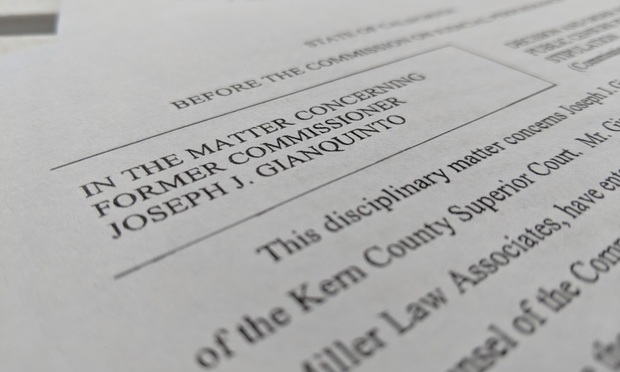Ex-Court Commissioner Censured for Inflammatory Facebook Posts
Gianquinto's attorney said, "The commissioner is looking forward to putting the matter behind him."
August 22, 2018 at 05:14 PM
5 minute read
 Retired Commissioner Joseph Gianquinto accepted a public censure by the Commission on Judicial Performance.
Retired Commissioner Joseph Gianquinto accepted a public censure by the Commission on Judicial Performance.
A former Kern County court commissioner has been barred from holding any future judicial office after a state disciplinary agency censured him for Facebook messages criticizing Muslims, Democrats, Native Americans, immigrants and same-sex marriage, among other topics and groups.
Retired Commissioner Joseph Gianquinto accepted a public censure, the worst punishment that can be meted out by the Commission on Judicial Performance short of removal from office. As part of an agreement with the agency, Gianquinto said he would never again run for judge, seek a judicial appointment or accept work as a subordinate judicial officer or judge pro tem.
Gianquinto's attorney, Katy Cummings of Miller Law Associates, said she was not authorized to comment on the case other than to say, “The commissioner is looking forward to putting the matter behind him.”
Gianquinto retired in March. The state bar's website lists Gianquinto's status as inactive.
Gianquinto, named a commissioner by the Kern County bench in 2007, posted inflammatory memes between 2016 and 2017 on his Facebook account, which identified the author as “Jj Gianquinto.” The page said he worked for Kern County but did not mention he was a court commissioner.
Among his posts:
- “As I drove to the gym this morning, my route goes past several low income housing units recently built, and some apartment buildings that are also low income. I did not see a single light on at 6:00. That is when people going to work arise.”
- Over a meme that reads, “We Shouldn't Reward Illegal Immigrants With Driver's Licenses,” Gianquinto wrote “DAMN STRAIGHT # No Amnesty.” One of Gianquinto's duties as commissioner was handling traffic cases.
- Another post shows a photo of two wedding rings with the caption, “One man, one woman … Say 'I do' to supporting traditional marriage.” Gianquinto added: “Amen … Absolutely I do! Anyone who may disagree is free to take it up with God. #OneManOneWoman One Nation Under God.”
- Various posts express contempt for former President Barack Obama and 2016 Democratic presidential candidate Hillary Clinton. “LIBERALS ARE AMERICA'S CANCER. Any doubt in your mind?”
After the court's then-presiding judge, Charles Brehmer, confronted Gianquinto with the posts in May 2017, the commissioner said he deleted the posts in question and made his Facebook account private, according to the Commission on Judicial Performance. Gianquinto also said he reported what he had done to the commission.
In June 2017, Brehmer issued a private reprimand to Gianquinto for posting material that could give “members of the public … the impression that you were biased.” Brehmer wrote that he was satisfied that Gianquinto “appropriately addressed” his “errors in judgment,” according to the commission's report.
Despite what Gianquinto had told Brehmer, the commissioner's Facebook account remained public and at least six of the posts flagged by the presiding judge remained visible until at least August 2017, the commission said. Brehmer blamed his unfamiliarity with Facebook's operations and eventually removed the posts and increased the privacy settings on his account.
The commission said Gianquinto's actions violated numerous provisions within four judicial canons.
“Mr. Gianquinto's conduct on Facebook was egregious, and is the type of conduct that inherently undermines public confidence in the judiciary and that brings the judicial office into disrepute,” commissioners wrote.
Media archives and the National Center for State Courts have documented occasions when judges have been disciplined for posting improper remarks and materials on social media. Just last year the Commission on Judicial Performance admonished an Orange County judge for posting unfounded accusations about a prosecutor on Facebook.
An ethics opinion by the California Judges Association warns any jurist using social media that “caution is essential.”
“Internet communications are permanent and lack the privacy of in-person or telephonic conversations,” the opinion reads. “Judges must be careful to avoid making remarks that would cast doubt on the judge's ability to act impartially.”
The CJP's censure is posted below:
Read more:
Deal Would Allow First Audit of Judicial Performance Agency
Court Executive Tried to Frame Judge for Wrongdoing, DA Alleges
LA Judge Rebuked for Media Interview, 'Flippant' Court Remark
Trinity County Judge Will Resign Amid Disciplinary Investigation
Napa Judge, Accused of Stealing Business Card Holders, Faces Discipline
This content has been archived. It is available through our partners, LexisNexis® and Bloomberg Law.
To view this content, please continue to their sites.
Not a Lexis Subscriber?
Subscribe Now
Not a Bloomberg Law Subscriber?
Subscribe Now
NOT FOR REPRINT
© 2025 ALM Global, LLC, All Rights Reserved. Request academic re-use from www.copyright.com. All other uses, submit a request to [email protected]. For more information visit Asset & Logo Licensing.
You Might Like
View All


TikTok Hit With California Class Action for Allegedly Mining Children's Data Without Parental Consent

Khan Defends FTC Tenure, Does Not Address Post-Inauguration Plans
Trending Stories
- 1Lavish 'Lies' Led to Investors Being Fleeced in Nine-Figure International Crypto Scam
- 2AstraZeneca Files Flurry of Lawsuits to Protect Cancer Treatment Drug
- 3American Airlines Legal Chief Departs for Warner Bros. Discovery
- 4New Montgomery Bar President Aims to Boost Lawyer Referral Service
- 5Deadline Extended for Southeastern Legal Awards
Who Got The Work
Michael G. Bongiorno, Andrew Scott Dulberg and Elizabeth E. Driscoll from Wilmer Cutler Pickering Hale and Dorr have stepped in to represent Symbotic Inc., an A.I.-enabled technology platform that focuses on increasing supply chain efficiency, and other defendants in a pending shareholder derivative lawsuit. The case, filed Oct. 2 in Massachusetts District Court by the Brown Law Firm on behalf of Stephen Austen, accuses certain officers and directors of misleading investors in regard to Symbotic's potential for margin growth by failing to disclose that the company was not equipped to timely deploy its systems or manage expenses through project delays. The case, assigned to U.S. District Judge Nathaniel M. Gorton, is 1:24-cv-12522, Austen v. Cohen et al.
Who Got The Work
Edmund Polubinski and Marie Killmond of Davis Polk & Wardwell have entered appearances for data platform software development company MongoDB and other defendants in a pending shareholder derivative lawsuit. The action, filed Oct. 7 in New York Southern District Court by the Brown Law Firm, accuses the company's directors and/or officers of falsely expressing confidence in the company’s restructuring of its sales incentive plan and downplaying the severity of decreases in its upfront commitments. The case is 1:24-cv-07594, Roy v. Ittycheria et al.
Who Got The Work
Amy O. Bruchs and Kurt F. Ellison of Michael Best & Friedrich have entered appearances for Epic Systems Corp. in a pending employment discrimination lawsuit. The suit was filed Sept. 7 in Wisconsin Western District Court by Levine Eisberner LLC and Siri & Glimstad on behalf of a project manager who claims that he was wrongfully terminated after applying for a religious exemption to the defendant's COVID-19 vaccine mandate. The case, assigned to U.S. Magistrate Judge Anita Marie Boor, is 3:24-cv-00630, Secker, Nathan v. Epic Systems Corporation.
Who Got The Work
David X. Sullivan, Thomas J. Finn and Gregory A. Hall from McCarter & English have entered appearances for Sunrun Installation Services in a pending civil rights lawsuit. The complaint was filed Sept. 4 in Connecticut District Court by attorney Robert M. Berke on behalf of former employee George Edward Steins, who was arrested and charged with employing an unregistered home improvement salesperson. The complaint alleges that had Sunrun informed the Connecticut Department of Consumer Protection that the plaintiff's employment had ended in 2017 and that he no longer held Sunrun's home improvement contractor license, he would not have been hit with charges, which were dismissed in May 2024. The case, assigned to U.S. District Judge Jeffrey A. Meyer, is 3:24-cv-01423, Steins v. Sunrun, Inc. et al.
Who Got The Work
Greenberg Traurig shareholder Joshua L. Raskin has entered an appearance for boohoo.com UK Ltd. in a pending patent infringement lawsuit. The suit, filed Sept. 3 in Texas Eastern District Court by Rozier Hardt McDonough on behalf of Alto Dynamics, asserts five patents related to an online shopping platform. The case, assigned to U.S. District Judge Rodney Gilstrap, is 2:24-cv-00719, Alto Dynamics, LLC v. boohoo.com UK Limited.
Featured Firms
Law Offices of Gary Martin Hays & Associates, P.C.
(470) 294-1674
Law Offices of Mark E. Salomone
(857) 444-6468
Smith & Hassler
(713) 739-1250






